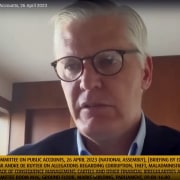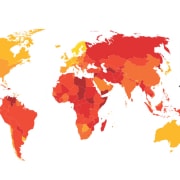|
Getting your Trinity Audio player ready...
|
 With South African general elections the biggest news story of the moment, citizens are more than ever conscious of the need to hold their leaders accountable for misuse of power and public funds. A number of corruption-related scandals that surfaced in the months leading up to 7 May gave many people cause to think carefully about which party they would vote for.
With South African general elections the biggest news story of the moment, citizens are more than ever conscious of the need to hold their leaders accountable for misuse of power and public funds. A number of corruption-related scandals that surfaced in the months leading up to 7 May gave many people cause to think carefully about which party they would vote for.
But it’s not just political leaders that need to practise accountability and responsibility, says businessman Ras Myburgh in this opinion piece. Business, religious, community, sports, schools and informal leaders also need to embrace good values if systemic corruption and other problems such as crime are ever to be addressed and overcome.
Corruption Watch agrees – the organisation is a strong advocate of citizen involvement in the fight against corruption, and regularly engages with various sectors of society, including schools, communities, youth and more recently, with the private sector.
Myburgh states that it takes more than just rules and regulations to achieve good governance, success and sustainability in business – accountability and responsibility are equally, if not more important.
We need more than profit to grow a future
By Ras Myburgh
Business leaders have a disproportionate influence on the culture and values of their sphere of influence. Consider any organisation: how they operate is ingrained in their daily behaviours – often driven by the values of the leader above.
Yet this accountability and responsibility is often overlooked by the very same leaders, their governing bodies and those who appoint, sanction and influence them.
We are quick to mourn the decay in the moral fabric of our society, rising crime levels and the alarming increase in systemic corruption, to name a few. In fact, we often lay the blame for this at the door of politicians and government. Granted, this area of leadership has responsibility to provide basic service, but the responsibility to uphold and shape the values and norms of society is shared by many other leadership positions. This responsibility extends beyond the formal leadership roles to informal roles in the church, sports club, schools, households and family – as well as in business.
It has become clear over the last two decades that we cannot legislate compliance. Think about the findings of the 2001 Enron scandal and current best practice in work place safety that emphasises behaviour founded in values and norms rather than rules and regulations.
Lasting success is more likely achieved by changing "the way we do things around here" than by putting up a list of rules. This requires entire business systems – management, shareholders, boards and other influences – to work towards increasing the relative weight of foundational values and norms in our business.
We must value good values.
Looking beyond next quarter’s profits
The King Report on Corporate Governance is South Africa's undisputed best practice guide on the topic, and is considered internationally by many as quite progressive. King III is built on a philosophical foundation that stands on three legs. Firstly, a requirement of leadership characterised by ethical values of responsibility, accountability, fairness and transparency based on moral duty. Secondly, that sustainability is the moral and economic imperative of the 21st century and that nature, society and business are intertwined in complex ways that need to be understood by decision makers. Thirdly, that corporate citizenship is an imperative that flows from the fact that a company is a person and should act in a sustainable way in its environment.
The need for sustainability recognises the complex interrelationship between business and society with common short and long-term goals. The norm, however, is a strong focus on short term profit; performance of next month, next quarter or at best the next financial year.
Rapid changes in technology, competition, tight and shifting margins all drive this short-terminism. Add to this the nature of shareholding in public companies (think short term investor and ease of trading in stocks) and we can see why we barely take note of the horizon.
Leaders will do well to remind themselves that the lifecycle of the company – as well as many areas it directly and indirectly impacts, like the communities where it operates, natural resources, the natural environment, and more – has lifecycles longer than the next quarter or next financial year.
For profit companies exist to make money and many will do better by expanding their focus to look into further into the future. This focus on future success requires a culture of caring, accountability and fairness. It requires business discipline to consider the impact of short-term decisions on the longer term impact on the company, the natural environment and its non-shareholder stakeholders and a strongly rooted value in this regard for the company to act on it.
Changing with the times
In the mid-90s, a listed mining company in South Africa found itself exposed to the changing socio-economic and political environment. It faced the same uncertainties as all other mining companies with the introduction of the Mineral and Petroleum Resources Development Act and associated Mining Charter. And, since its great-grandparent was an apartheid state-owned enterprise, it had a legacy and image not well attuned to the changing times.
What to do? Fortunately the company had a strong foundational value set grounded in integrity, respect, fairness and caring. It used these common values to link its understanding and response to the changing requirements of the environment. Caring and respect for others helped to shape a value set in line with sustainable development principles and respect for the law, while fairness made it easy for the company and its leaders to engage with other stakeholders and understand the changing requirements of being a good corporate citizen in the new environment.
It was through its understanding of its responsibility to make money now and into the future that the company could justify committing resources towards long-term wealth creation for its stakeholders, by investing in better living and working conditions for staff, facilitating empowerment equity, employment equity, upliftment of the communities where it operates and more.
This story relates to the third philosophical pillar of King III which is corporate citizenship. It is for the very fact that a company is so integral to society that it is considered a citizen of the country – as much as a person would be a citizen – and therefore is expected to act responsibly as far as economic, social and environmental issues are concerned.
Historically, company law holds the position that directors (and managers) owe their duties primarily to shareholders (or owners).
Sustainability and corporate citizenship, however, requires that the legitimate interests of all stakeholders – employees, customers, government, surrounding communities, etc. – need to be taken into account.
Balancing the legitimate expectations of stakeholders – which are often not directly reconcilable – is no mean task.
Spare a thought for government, labour and business leaders in the South African mining sector at the moment. Times are difficult and the challenges are many. Role-players should ask themselves what possible neglect of legitimate stakeholders’ expectations could have led to the current situation, but more so, how can we restore the balance without throwing the baby out with the bathwater?
What is certain is that there is no lasting quick fix to the challenges. The parties will have to think long-term and start to plan and act in that way. And we can start by building our future growth on the right values.
• Businessman Ras Myburgh is a HEARTLINES board member. HEARTLINES is a Johannesburg-based NGO which uses multimedia to promote values-based societies.








